On Gold Mountain Read online
Page 32
What of Europe? You must have been happy there. That is where you had so much fame.
This is what I know. I couldn’t get a decent job in America and I wanted to be a star. When I went to London, someone asked me, “Why did you leave America?” This is what I said: “I left America because I died so often. I was killed in virtually every picture in which I appeared. Pathetic dying seemed to be the thing I did best.”
Another time a reporter asked me that same question and I answered, “When I left Hollywood I vowed that I would never act in films again. I was so tired of the part I had to play. Why is it that the screen Chinese is always a villain? And so crude a villain—murderous, treacherous, a snake in the grass! We are not like that. How could we be, with a civilization that is so many times older than that of the West? We have rigid codes of behavior, of honor. Why do they never show these? Why should we always scheme, rob, kill? I got so weary of it all—of the scenarists’ conception of the Chinese character. You remember Fu Manchu? Daughter of the Dragon? So wicked!”
I’m telling you this because I knew I was creating bad stereotypes. That’s why I wanted the part of O’Lan so badly. The Good Earth showed Chinese people in a good light, but Thalberg wanted white actors for the leading roles. Today, when they say I perpetrated those stereotypes, I wonder.
I couldn’t take any more of America. So, in 1928, I sailed for Germany to make Schmutzies Geld. Someone told me that means Dirty Money. Then I went to Paris, then London, then back to Berlin. I learned to speak German and French. At least I said I learned those things. Perhaps I just learned how to pronounce the words before the camera. Perhaps I had no idea what I was saying. Perhaps I learned my lines by typing out my scripts. It doesn’t matter, because I was a star. In 1929, I was in A Circle of Chalk with Laurence Olivier. At night, at the stage door, people waited for me. Did they wait for Olivier? Never. I would walk outside into the fog or rain, and they would be there—young men in their tuxedoes, young women with their bangs cut straight and blunt. Those young men lusted for me. Those young women tinted their faces ivory with ocher powder, hoping to duplicate my complexion.
In 1931, Sessue Hayakawa said, “Come back to America to star in Daughter of the Dragon.” I told reporters, “It is good to be home. I’m glad they want me back here to make a picture. I must confess I was discouraged when I left Hollywood. But I wasn’t bitter. Everyone had been kind to me. And I’m grateful now; it wasn’t easy at the start. It makes me appreciative of good fortune.” The next year I was in Shanghai Express.
Is China your home country?
The Chinese have their own ways of being cruel. When I went to China after I lost the part in The Good Earth, I thought, Ah, perhaps this is my home. In Nanking, officials held a four-hour state dinner for me. I spoke Cantonese. They spoke Mandarin. Let me tell you something about these two languages. It’s not like the difference between Spanish and Italian. Mandarin and Cantonese are as different from each other as German and English.
I told my interpreter, “Tell me everything they say. I want to know everything.” Through the dinner he whispered quietly in my ear what the others were actually saying as they stood to make their “toasts.” “Does she know that her films are banned in our country? What of this courtesan in Shanghai Express? Is this how she wants the world to view Chinese women? Does she realize how she degrades our mothers and sisters and wives and daughters?” I sat there. I smiled. I listened. I told them in English, “When a person is trying to get established in a profession, he can’t choose his parts. He has to take what is offered. I came to China to learn.” When I was done, they gave me a standing ovation. And in America they wrote, “She was received like a princess.”
I stayed in China for ten months. All my life I had been homesick for China, even though I had never been there before. The rhythm of life there harmonized with something in me that had been out of tune. I was no longer restless. It’s hard to explain. Our Chinese expression “being in harmony with heaven and earth” is the essence of it. I went to Toishan to visit my home village. The women came out. They didn’t believe I was real. They thought I was machine-made on the movie screen.
When I returned to America, I worked hard to raise money to help the people of China. I spoke everywhere. Paramount didn’t mind. The studio was helpful. Publicists wrote press releases for me: “In view of current events in the Orient, anything Japanese annoys Anna May Wong, Chinese actress.” I had an apartment overlooking a Japanese garden. When I looked at it I got angry. I wasn’t soothed. I kept a bowl of goldfish. I always had fish, because it calmed me to watch them swim, and I could forget whatever bothered me. But I couldn’t stop thinking about that garden. Paramount sent out another release: “Last night Miss Wong moved to a furnished home in another part of Hollywood, far from any landscaping suggesting Japan.”
And you ask, Was it enough not to look at a Japanese garden? Of course not. I had one of the largest and most expensive wardrobes in Hollywood. I’d bought gowns in Paris, New York, Hollywood, and China. I auctioned off more than two hundred gowns, ensembles, wraps, accessories—including fans, jewelry, and headdresses. All the money went to relief funds.
This is what I know: When I kissed Jameson Thomas in Piccadilly, British censors cut it. When I was courted on screen by a Russian duke in Haitang, Hungarian officials banned the film. No film lover could ever marry me. If an American actress was made up with slanted eyes and eyebrows, and wore a stiff black wig and dressed in Chinese costumes, it was all right. But me? I was full Chinese. I always died in the movies, so that the white girl with the yellow hair could get the man.
My answer to all of your questions? I never belonged anywhere, because no place was home to me.
My father was a laundryman. You know what this is like—nonstop work, and people treating you badly and not paying the proper amount. My parents sent me to Chinese school after regular school, but I hated it. Instead, I went to the movie theater to see The Perils of Pauline. Do you remember, Stella, how we used to laugh about that, how you saw the same things in Waterville and wished you were somewhere else and I was in Los Angeles and wished I were someone else?
I was born Wong Liu Tsong. It means something like Frosted Yellow Willows or Frosted Willow Blossoms or Hoarfrost of the Willow Trees. All my life I wished for something different. I remember coming home from the serials and standing in front of the mirror and acting out all the parts. I remember walking to school and holding my eyes wide open so that I would look Caucasian.
When I was ten years old, I worked for a furrier. Sometimes I was a model. Once they dressed me in a mink coat and brocaded ankle-length pantaloons and took my picture for the rotogravure section of the newspaper. My father was so impressed by my elegance that he cut out the picture and sent it to my half-brother in China. My brother wrote back, “Tsong is indeed very beautiful, but please send me the dollar watch on the other side.” You know what I say to that? A fur coat doesn’t tick.
One day I heard about a movie they were making about the Boxer Rebellion—The Red Lantern. I went to a casting agent. Was it Tom Gubbins? No. It was Reverend Wang, the Baptist minister. He said, “Well, you got big eyes, big nose, big ears and mouth. I guess you’ll do.” He changed my name to Anna May Wong. I was twelve years old and I wanted to be in pictures. For two more years I went after school to work on different movies as an extra. My brothers, my sisters, they kept it a secret. They knew how mad my father would get. One day, one of my sisters said she had to tell Father, to soothe her own conscience.
My father was angry with me. He said people in Hollywood used harsh words. He said acting was not an honorable profession. He said things about white men: “They will take advantage of you. They will compromise you.” My father got so angry he tried to arrange a marriage for me. He didn’t ask me what I thought. But I’ll tell you. I thought, I don’t want a husband to boss me around. I don’t want to live my life in Chinatown. I don’t want to marry a cook or a laundryman. I don’t w
ant a husband who will take all my money, even if he lets me keep working. Besides, no Chinese man will marry me. I’d become too American to marry one of my own race.
My father gave up and I never got married. And when I was in The Thief of Bagdad my costume was so see-through that my family never forgave me. In their eyes, I was like a courtesan. Only my brother Richard remained faithful to me. Still, did my father complain that I brought home money? Did he complain when I supported the whole family? Did he complain when I bought one brother a typewriter and helped another to learn photography? Did he complain when I put all my brothers through private school? And here is the truth: I was beautiful as the slave girl.
After The Thief of Bagdad, the press began to call me “the celestial maiden.” They called me “sloe-eyed.” They called me “exotic.” They called me “the Oriental Siren,” “the China Doll,” “the Lotus Girl,” “the Chinese Flapper.” They called me “the Queen of the B-films.” They said I’d never cut my hair, never worn eyeglasses, never worn wool underwear, never curled my hair, never eaten lobster, never been on a bicycle, never owned a radio. They said I had the longest nails in Hollywood—which was true. They made it news when I cut my nails for Daughter of Shanghai. It was news again when I grew them back two inches and protected them with gold nail guards for Dangerous to Know.
Have you ever thought about what it would be like to be beautiful? In 1938, Look magazine called me “The Most Beautiful Chinese Girl in the World.” I remember once in London I stopped a debate in Parliament when I walked into the visitors’ gallery. They stopped everything just to watch me walk, watch me sit down. When I came back from my “Triumph Abroad,” they said I was the “Toast of the Continent.” They said my complexion was like “a rose blushing through old ivory,” that my face shone on the screen like a Ming vase. But when Hollywood wanted a “Chinese,” they hired Luise Rainer, Sylvia Sydney, Dorothy Lamour, Myrna Loy, and Sigrid Gurie.
Behind my back, people talked about how lonely I was. Even today, some say, “Didn’t Anna May have tuberculosis?” “Didn’t Anna May drink?” “Didn’t she have sad love affairs?” “Didn’t she become a virtual recluse?” “Didn’t her brother have to take care of her?” Did any of them ever ask me?
This is what I want to ask you: What would you do if your family was ashamed of you? What would you do if you were their worst secret? This is what I did: It was the end of 1930 and I was on Broadway doing On the Spot with Wilbur Crane, when my mother crossed a street in Los Angeles and was hit by a car. My brothers called and told me. They left nothing out. Fracture of the skull. Broken leg. Internal injuries. They called later to say that our mother had died. Can you imagine how I felt to be so far away? Do you know how I felt when the police let the driver go free? But look, he was a white man. I filed a lawsuit. My father and my brothers and sisters joined me. What would they have done if I wasn’t there?
So I say let people gossip all they want. Does it change my life? Does it make me disappear? When I returned from China, I found here a restless seeking for something that couldn’t be found. The Chinese found it many years ago—a sort of serenity, an inner calm that comes from the understanding of life. This is such a short life. And mine was truly short. Only fifty-four years.
People say, Oh, she died of a broken heart. She died of disappointment. She died of too much bitterness. She died to pay for her sins against the Chinese people. But I say nothing matters one way or the other. I have learned not to struggle, but to flow along with the tide.
CHAPTER 15
SECOND CHANCES
1939–41
ON February 21,1939, less than a year after it opened, a fire leveled China City. Officials blamed the fire on smoldering firecrackers used in celebration of Chinese New Year. Most of the shopkeepers, including Fong Yun, had no insurance. For a few unfortunates, it meant the loss of all their worldly possessions; beaten, they simply walked away. But many of the inhabitants dipped into savings or borrowed money from relatives to reopen; Fong Yun once again went to his brother for help and received it.
Three months later, on May 17, 1939, Union Station—built over the ruins of Apablasa Street—opened and was billed as “the most modern terminal in America.” Angelenos were already producing more than half of the country’s airplanes, and the most incredible traffic jams in the history of mankind. To combat the latter, a proposal for a four-hundred-mile network of freeways had been introduced.
On August 2,1939, China City reopened amid great fanfare. A troupe of actors performed selections from famous Chinese operas. Lion and dragon dancers gyrated and shimmied through the alleyways. Magicians, musicians, and devil dancers worked their charms. Fireworks—carefully monitored this time—were set off. Café owners doled out souvenir chopsticks, while the proprietors of stalls and shops handed out lichees. But business would never be quite the same. China City would stumble along year after year, becoming more rickety and rundown as New Chinatown continued to prosper and grow.
Soon after China City burned, Stella discovered she was pregnant. Both Eddy and Stella regarded this as a chance to start their marriage afresh. But Stella sensed that there’d be problems with the pregnancy. Her doctor reinforced her foreboding by calling on weekends and at odd hours. At the end of December he began calling every day to ask when she was going to come in and have the baby. Stella always answered, “It’s not time yet. I’ll go to the hospital on January fifteenth.”
On the day Stella finally went to the hospital, she stopped to see Ticie and Sissee at the house on Maplewood. “Take care of Richard if some thing happens to me,” she said, so convinced was she that she was going to die. The last thing she remembered was her doctor talking softly, reassuringly, as the anesthesiologist put the mask over her face. When she woke, Sissee was sitting next to the bed. “The baby?” Stella asked.
Her sister-in-law’s eyes brimmed with tears. “He’s alive, Stell, but he’s not going to make it.”
Strong as she was, Stella wasn’t strong enough to see the infant, who’d been born hydrocephalic. The baby’s head was huge and filled with water, the doctor explained. He’d be lucky to die quickly. A couple of days later the doctor came in again to say that the baby had died. Stella blamed herself. She believed that if she hadn’t had the abortion when Eddy was fooling around with Helen Smith, the baby wouldn’t have died.
Six months later, in June 1940, President Roosevelt signed into law the Alien Registration Act, which required the registration and fingerprinting of aliens and made it unlawful for them to belong to “anti-American” organizations. In November, Roosevelt was reelected for an unprecedented third term.
This same month, Angel Island closed. Although as early as 1922 the immigration station had been deemed “too filthy and unfit for habitation,” it wasn’t until November 4, 1940, that the last 125 Chinese men and 19 women held on the island were moved to a temporary facility in San Francisco. Once war was declared, the U.S. Army conscripted the island for the detention of Japanese prisoners of war. After the war, the barracks would continue their slow decay.
As these world events and small personal stories unfolded, the people living in the four Chinese communities of Los Angeles—China City; New Chinatown; the last rundown blocks of Old Chinatown, west of Alameda; and the Market Chinatown, by the City Market—intensified the civic activities that had their inception during the Depression and now continued through the Sino-Japanese war. Horrified at reports of starvation and orphaned children, Chinese American women joined organizations to raise money to help China defend herself and to alleviate the suffering of her people. These women, who had for so long been silent, appealed to women of all races to wear cotton stockings instead of Japanese-made silk. They raised money for medical supplies and food. They organized bazaars, fashion shows, and theatrical and dance productions.
Beginning in 1938 and throughout the war, all the Los Angeles Chinatowns participated in a Moon Festival to raise money for United China Relief. Over several weeks,
excitement escalated as a Moon Festival Queen was selected for her beauty and manners. David Soo Hoo, the brother of the founder of New Chinatown, suggested that other girls form a drum corps. In years to come, the Mei Wah girls would become a regular feature at parades and festivals throughout the southland.
During the coming years, Chinese Americans—who had traditionally avoided conflict or the appearance of being “troublemakers”—took to the streets in parades and demonstrations against American companies selling scrap iron and oil to Japan. Chinese picketed Japanese-owned factories and businesses. The Chinese boycotted Japanese goods, many of which had been mainstays in their small shops. (Sometimes the “boycott” meant simply sitting the whole family down for hours to peel off the little stickers that read “Made in Japan.”)
No one lives on in the memories of Chinatown residents for her pro-China stance more than Mrs. Leong, the wife of the owner of the Soochow Restaurant and mother of Gilbert Leong. Mrs. Leong, who had female relatives who’d been raped, beaten, and murdered by Japanese soldiers, put the same obsessive energy into raising money for China Relief that she did into drilling her Chinese students on their calligraphy. When the Chinese Chamber of Commerce made up contribution cans printed in English and Chinese to put in stores and restaurants, Mrs. Leong boarded the bus and went all over the city to every place she’d heard there was a Chinese restaurant or laundry to drop off a can. She traveled out to Hollywood, the beach cities, and even to outlying areas that seemed to have no names. Each month, Mrs. Leong came out the leader in collected contributions.

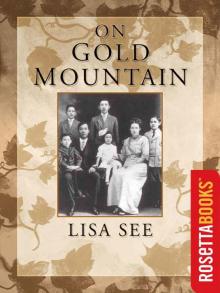 On Gold Mountain: The One-Hundred-Year Odyssey of My Chinese-American Family
On Gold Mountain: The One-Hundred-Year Odyssey of My Chinese-American Family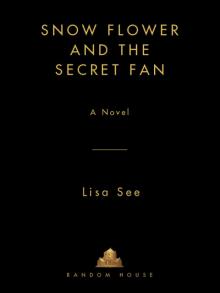 Snow Flower and the Secret Fan
Snow Flower and the Secret Fan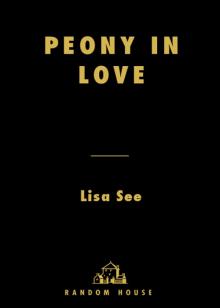 Peony in Love
Peony in Love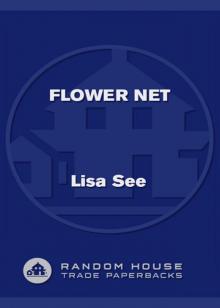 Flower Net
Flower Net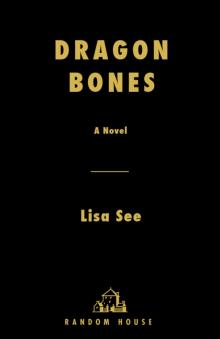 Dragon Bones
Dragon Bones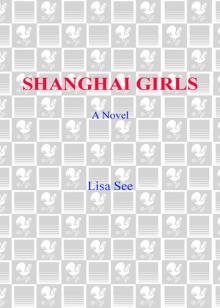 Shanghai Girls
Shanghai Girls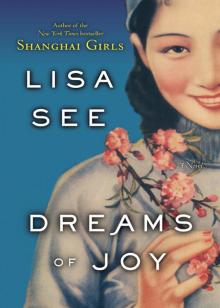 Dreams of Joy
Dreams of Joy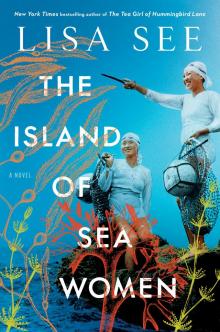 The Island of Sea Women
The Island of Sea Women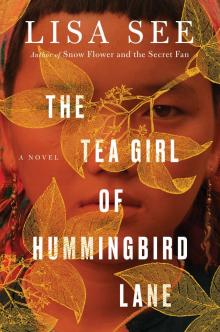 The Tea Girl of Hummingbird Lane
The Tea Girl of Hummingbird Lane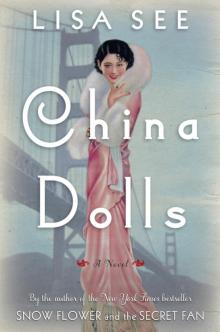 China Dolls
China Dolls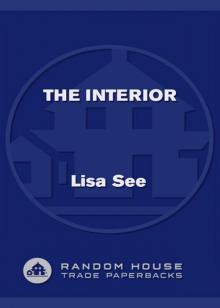 The Interior
The Interior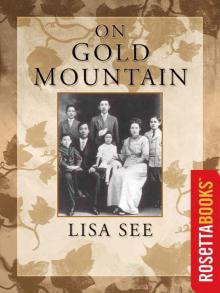 On Gold Mountain
On Gold Mountain